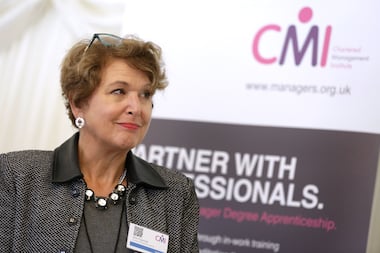Inspiring Women: how you can break the ‘glass pyramid’

CMI’s Ann Francke talks to a panel of female business leaders about how to get more women into senior management roles
Matt ScottThe glass ceiling is an all too common concept when it comes to gender equality in the workplace, but CMI chief executive Ann Francke has a new notion – the glass pyramid.
Chairing a panel discussion at the 2015 Inspiring Women in Business Conference in London, Francke described her glass pyramid and how it represented the challenges facing women in business.
“The majority of university leavers and junior managers are female, and that’s true in most professions,” she said. “When we get to the middle of the pyramid, the 50-60% [of females in junior roles] is dropping to 30% or 40%.
“Then when we get to the senior ranks [the proportion of women] is around 20%, and then for the leaders it drops to single digits.”
One way aspiring women leaders can start to climb up the pyramid and address this gender imbalance at the top of organisations is through support networks.
American Express vice president and general manager UK and CMI companion Karen Penney said she had gained great benefit from the women’s business network at her company.
“Within American Express there is a big support network for women,” she said. “We have a women’s interest network and something called Pathways to Sponsorship, which really encourages senior leaders to sponsor other women. That’s made a big difference to my career and to lots of other women too.
“We also have to encourage men to get involved [in these initiatives] and we enforce a rule that women have to be interviewed when a senior role comes up. You might not get the role, but at least your name comes up.”
The panel also told delegates that businesswomen needed to be more adept at selling their skills – something research has shown men are much more comfortable with doing.
Carla Buzasi, global chief content officer for WGSN and former founding editor-in-chief of The Huffington Post UK said women needed to ‘Be More American’ when it came to promoting their skillsets.
“You have to show how hard you are working, and that’s when you get promoted and get those pay rises,” she said. “I have in the back of my head ‘Be More American’.
“The only reason I have won the awards I have is because I put myself forward for them. I worked very hard so I have the tools to fill in those applications, but no one is ever going to do that for you.”
Vodafone UK head of consumer services & innovation Alix Pryde said that women could often lack confidence in the workplace and encouraged delegates to not be held back by their self-perceived limitations.
“One great piece of advice I’ve learnt from my career is bite off more than you can chew,” she said. “Women tend to be more risk-averse, and that can be a good thing, but the flip-side of that balanced approach to risk is women can lack confidence in pushing themselves to the next level and stretching and testing themselves.
“I am really into failure. Some of the best and most positive feedback I have ever had has been off the back of when something has gone wrong and I have had to dig deep for resilience.”
“Without failure you never learn,” she added.
Penney added that businesswomen also needed to start thinking more about their strengths rather than their weaknesses when looking at applying for a promotion.
“We always talk about the things we are not very good at, rather than the things that we are really good at,” she said. “I’m a firm believer in if you have a strength you need to play to that strength, and try and add other bits to it.
“I try to keep people aware of my core strength, but also show I am keen to learn other skills around it to supplement what I think I am really good at.”

Press & Media Enquiries
For more information or to request interviews, contact CMI's Press Team on 020 7421 2705 or email press.office@managers.org.uk


